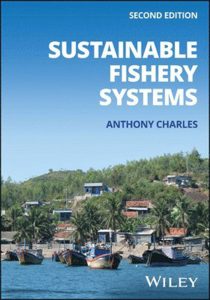Filled as it is with analysis and insights, the second edition of Anthony Charles’ Sustainable Fishery Systems is an absolute must for every fisheries library and bookshelf
This article is by Maarten Bavinck (j.m.bavinck@uva.nl), Professor Emeritus, Department of Human Geography, Planning and International Development Studies, University of Amsterdam, and Chairperson, ICSF
For those of us not completely up to date on how capture fisheries are practised and managed, the second edition of Anthony Charles’ Sustainable Fishery Systems is an absolute must. It has been thoroughly revised. The first edition, published in 2001, counted only 370 pages. This new edition is double that size: not only has the previous text been completely reviewed, the author has added chapters on salient fishery concerns of today, with the achievement of sustainability and resilience at its core.
Anthony ‘Tony’ Charles is director of the School of the Environment and professor in the Sobey School of Business at Saint Mary’s University, Halifax, Canada. He is a long-time observer of capture fisheries. He has a distinguished record of international publications and has played a key role in many international fora, including the Food and Agriculture Organization of the United Nations (FAO), the Convention on Biological Diversity (CBD), and the International Union for Conservation of Nature (IUCN). He has led countless research initiatives, including the Community Conservation Research Network (CCRN). He has written about numerous topics, like the nature of conflicts in fisheries, the role of local knowledge, and the position of indigenous peoples in various parts of the world. In short, he is the ideal composer of a handbook on this topic.
The first thing to note about this second edition is the attention that it pays to small-scale fisheries. Each chapter contain a box of relevant quotations from the Voluntary Guidelines for Securing Sustainable Small-scale Fisheries in the Context of Food Security and Poverty Eradication (the SSF Guidelines). The author also makes numerous references to aspects that are of particular significance to small-scale fishers, such as the role of local knowledge and the importance of participatory management.
The book can be imagined hinging on one particular chapter, positioned in the middle, on the collapse of Canadian cod fishery. This occurred in the 1990s and affected one of the most iconic fisheries of the world; it is a supreme example of management failure, in which fishery fleets, researchers and government authorities together failed to foresee and address the enormous disaster that affected the entire Canadian east coast.
Reflecting as it does on one of the better-managed marine fisheries of the world, the analysis provides not only a warning signal but also an entry point to many of the topics that Charles attempts to address in the book, including the need to acknowledge the role of ‘Uncertainty in fishery systems’ (chapter ten), ‘Conflict in fishery systems’ (chapter eleven) as well as the importance of ‘Adaptive, robust and precautionary management’ (chapter fourteen). Charles points out that the primary victims of the collapse were the small-scale fishers who offered forewarnings of crisis but were largely ignored.
The purpose of the book is to contribute to the cause of sustainable fisheries. The author makes use of a social-ecological systems perspective, whereby the various elements of fisheries (from marine ecosystem through fish harvesting to consumption) are viewed as an interlinked whole. The early part (specifically, chapters two and three) thus describe fisheries from the viewpoint of the fish and the fishery ecosystem, subsequently moving to the human system that includes fishers, fishworkers, processors, traders, consumers and, finally, the fishing communities that connect them all.

Attention then moves to the governance and management system, considering rationales, possible objectives, and the institutional structures (chapter six). In the next two chapters, Charles describes in detail the range of available management instruments and the many ways in which fishery development is attempted. The latter chapter offers welcome respite from a dominant narrative that suggests that conservation and control are the sole duties of a fisheries manager.
In line with his concern for small-scale fishing communities, Charles pays substantial attention to what he calls ‘Fishery knowledge’ (chapter nine; this chapter replaces one in the original edition that was entitled ‘Fishery research’ and was geared toward scientific contributions.) In this newly composed text, Charles expands attention from the knowhow generated by scientists to include the so-called local knowledge in possession of the fishing communities that labour on the seas. Since this knowledge complements scientific knowledge, he argues that it deserves to be taken along in governance and management considerations. The relevance of such knowledge is one reason that Charles pleads for management styles that promote the participation of small-scale fishworkers (and fishers, more generally) in decision-making processes.
The book is specked with examples (and many photographs) from different parts of the world, and Charles is clearly concerned about including the Global South in his deliberations. The text does not, however, belie his Canadian origins and his training in the Western scientific tradition, which emphasizes rational management. In many countries of the Global South, governmental institutions for research and the implementation of management measures are weak, at best, and informal. It might have been useful to have paid more attention to data-poor fisheries and the limited toolbox available to many governing actors in these regions.
Though there is always a reason to gripe, as it stands, this handbook is not only comprehensive but also well written, providing guidance and insight to those interested in, and committed to fisheries, especially small-scale fisheries. Each chapter includes useful illustrations and concludes with a set of key messages. This book deserves a place in every fisheries library and bookshelf.
For more
Maarten Bavinck: Book Review (Tony Charles’ Sustainable Fishery Systems (2nd edition)) Sustainable Fishery Systems, 2nd Edition
https://www.wiley.com/en-in/Sustainable+Fishery+Systems%2C+2nd+Edition-p-9781119511793
Anthony (Tony) Charles
http://www.tonycharles.ca/